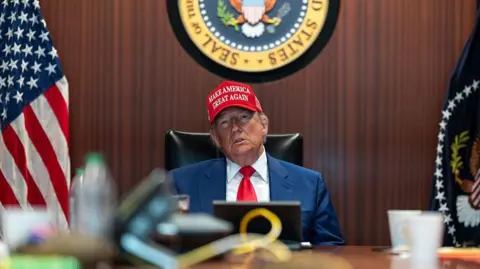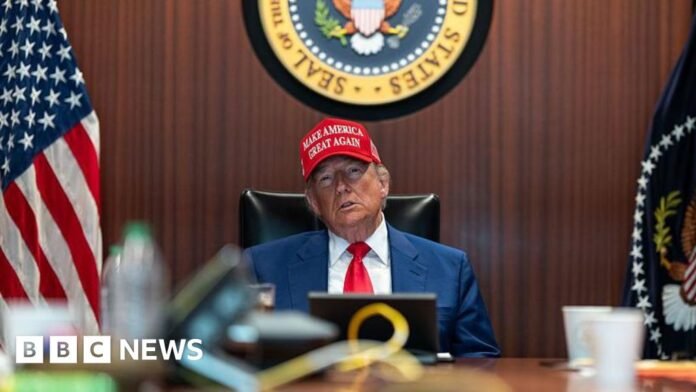 The White House via Getty Images
The White House via Getty ImagesIran had promised to retaliate for Saturday’s US strike on its nuclear facilities – and now it has.
According to early reports, all the Iranian missiles directed at the massive US base in Qatar were intercepted and there were no American casualties or damage.
US media reports, however, that Iranian officials have said that this salvo was not the end of their nation’s response.
During his address to the nation on Saturday night, President Donald Trump warned that there would be an overwhelming answer to any Iranian attacks on US interests. He promised that there were more targets that could be struck by American forces.
For more than 24 hours, the world waited to see what Iran would do. Once Iran had acted, attention swung back to the US president and, after a few hours, he had his say.
“Iran has officially responded to our Obliteration of their Nuclear Facilities with a very weak response, which we expected, and have very effectively countered,” Trump posted on his social media site.
He said that Iran had gotten it out of their “system” and added that “perhaps Iran can now proceed to Peace and Harmony in the Region”.
If the damage is indeed limited, and no additional Iranian attacks are forthcoming, Trump seems inclined to hold his fire in the hopes that the Iranians will be willing to negotiate in earnest.
Trump’s weekend attack on Iran was a high-risk manoeuvre, but a scenario in which it pays off is coming into view.
A similar dynamic played itself out in January 2020, when Trump ordered the targeted killing of Iranian Revolutionary Guard leader Qasem Soleimani in Baghdad.
Iran launched missiles at military bases in Iraq, injuring more than 100 American soldiers, but the US chose not to escalate. Cooler heads ultimately prevailed.
According to US media, in their latest attack on Monday Iran fired a number of missiles at American bases equal to the total number of bombs US warplanes dropped during its weekend attack.
That, along with the advance notice Iran provided to the Qatari government prior to the launch, for which Trump said he was grateful, suggests the Iranians are seeking proportionality, not escalation.
For most of the day, Trump was more focused on the price of oil, American media coverage and a suggestion by former Russian President Dimitry Medvedev that an outside nation provide Iran with nuclear weapons.
On his flight back from the G7 meetings in Canada Monday night, Trump had told journalists aboard that the US military was prepared for an Iranian threat.
“We have great people that know how to protect themselves,” he said. “Our troops are ready.”
If Iran has another round of attacks, however – and there are American deaths or significant damage – pressure will mount for Trump to respond.
On Sunday, US officials had stated, in no uncertain terms, that – unlike past US leaders – this president follows through on his threats.
To do so, however, would risk exactly the kind of protracted warfare that even some of Trump’s own supporters feared would result if the US joined this fight.
For the moment, however, Iran is offering an off-ramp from this conflict, and Trump appears more than eager to take it.







